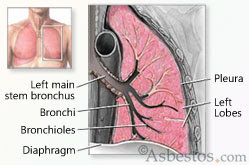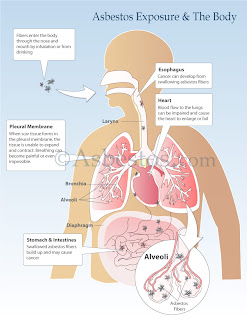Mesothelioma is a rare type of cancer that typically affects the lining of the lungs, heart and abdomen. Approximately 2,000 to 3,000 cases of mesothelioma are diagnosed each year in the United States, comprising around 3 percent of all cancer diagnoses. This cancer occurs about four times more frequently in men than in women and all forms of mesothelioma, except for benign mesothelioma, are invariably fatal.
The life expectancy for mesothelioma patients is generally reported as less than one year following diagnosis, however a patient’s prognosis is affected by numerous factors including how early the cancer is diagnosed and how aggressively it is treated.
In an effort to help patients understand mesothelioma, Asbestos.com offers a complimentary packet that contains treatment information tailored to your specific diagnosis. The packet also covers the nation's top mesothelioma doctors and cancer centers, as well as financial assistance options to help cover medical costs, can visit http://www.asbestos.com.
Mesothelioma Causes
 Mesothelioma is caused by asbestos exposure which occurs when fibers are inhaled or ingested into the body and become lodged in body cavities, causing inflammation or infection. Asbestos is a naturally-occurring fibrous substance that was widely used in the 20th century in a number of different industries. When the public became aware of the hazards associated with the mineral, warnings were issued in the mid-1970s and use of the product began to decline.
Mesothelioma is caused by asbestos exposure which occurs when fibers are inhaled or ingested into the body and become lodged in body cavities, causing inflammation or infection. Asbestos is a naturally-occurring fibrous substance that was widely used in the 20th century in a number of different industries. When the public became aware of the hazards associated with the mineral, warnings were issued in the mid-1970s and use of the product began to decline.The fact: more than 30 percent of those diagnosed with mesothelioma are veterans.
Mesothelioma Types
 There are five known types of mesothelioma. The four listed below are malignant cancers, and benign mesothelioma is a non-cancerous condition.
There are five known types of mesothelioma. The four listed below are malignant cancers, and benign mesothelioma is a non-cancerous condition.Pleural Mesothelioma: This type of mesothelioma develops in the lining of the lungs, known as the pleura. It is the most common form of malignant mesothelioma, with around 75 percent of cases being pleural in origin.
Peritoneal Mesothelioma: Comprising approximately 20 percent of mesothelioma cases, this form of mesothelioma develops in the lining of the abdominal cavity, known as the peritoneal membrane.
Pericardial Mesothelioma: This form of mesothelioma develops in the lining of the heart, known as the pericardium. Approximately 5 percent of all mesothelioma cases are pericardial.
Testicular Mesothelioma: Testicular mesothelioma develops in the tunica vaginalis of the testicles and is the rarest form of the cancer.
Mesothelioma Symptoms
Symptoms of mesothelioma often do not appear for 20 to 50 years after initial exposure to asbestos occurred. Mesothelioma symptoms often resemble less-serious conditions, which can make a diagnosis of mesothelioma difficult. Below is a list of several common symptoms mesothelioma patients may experience.
Pleural Symptoms: Shortness of breath, chest pain, persistent cough, fatigue, lumps under the skin on the chest
Peritoneal Symptoms: Weight loss, abdominal pain and swelling, bowel obstruction, nausea
Pericardial Symptoms: Heart palpitations, irregular heartbeat, chest pain, difficulty breathing, night sweats
Testicular Symptoms: Painful or painless testicular lumps.
Mesothelioma Diagnosis
The process of mesothelioma diagnosis usually begins with a review of a patient’s medical history followed by a physical examination.
If a problem is suspected, a doctor may request several diagnostic tests. These typically include medical imaging scans such as:
* X-rays
* CT scans
* PET scans
* MRI scans
A combination of these tests is often used to determine the location, size and type of the cancer. Biopsy procedures are often requested following an imaging scan to test samples of fluid and tissue for the presence of cancerous cells.
Mesothelioma Treatments
After a patient begins to demonstrate mesothelioma symptoms and a diagnosis occurs, the next step is often exploring applicable treatment options to create the best treatment plan possible. Treatment options range from surgery to chemotherapy and Asbestos.com offers mesothelioma patients and their loved ones comprehensive information about current treatment options and new developments in a complimentary informational packet available here.
The most common mesothelioma treatments recommended by doctors for patients include surgery, chemotherapy and radiation therapy. Experimental procedures, including immunotherapy and gene therapy are also utilized by mesothelioma patients. Patients often undergo multiple treatments to combat the disease.
Experimental treatments are also available to patients who participate in a clinical trial, conducted to test up-and-coming procedures and medications.
Mesothelioma Legal Issues
The dangers of asbestos exposure were known long before any efforts were made to protect workers. Thousands of American workers were exposed to asbestos during the 20th century, and were often unaware of the hazards of exposure.
Companies that produced asbestos-containing products or used these products on a daily basis are liable for their negligence in failing to protect their workers. If you or a loved one has developed mesothelioma or another asbestos-related disease as a result of asbestos exposure, you may wish to speak with an attorney to seek compensation to help cover medical expenses, lost income and pain and suffering. For more information about legal options please click here.
You know your projects stand out of the herd. There is something special about them. It seems to me all of them are really brilliant! holistic medicine cancer treatment
ReplyDeleteNice post. I was checking constantly this blog and I am impressed! Extremely helpful information specially the last part I care for such info a lot. I was seeking this particular information for a very long time. Thank you and good luck. new treatment
ReplyDelete